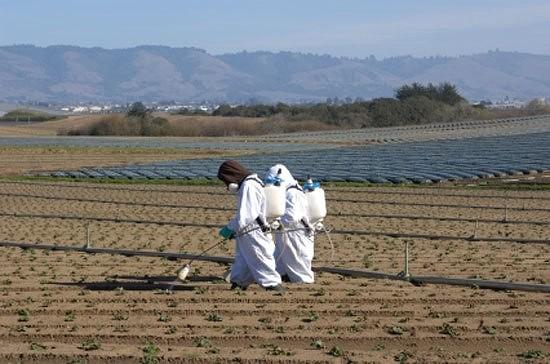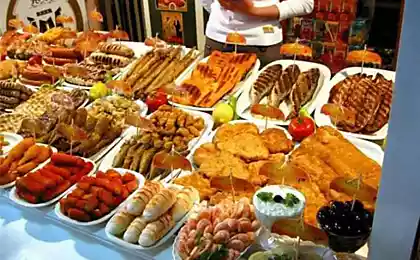639
5 foods that should not be there

On what kind of food, disgusted, you respond to failure? Peas, tofu or onions? In any case, it's probably because you do not like, what it tastes, not necessarily because it contains ingredients suspected of causing cancer or because when it is processed farmers wear protective suits.
However, there are many products on the shelves, which are representatives of the food industry, who know what is happening behind the scenes, refusing to eat. We interviewed some of these representatives - people who know their business and are working daily to bring pesticides, genetically modified organisms, animal abuse, social injustice and the junk food out of the food chain - to find out what they know about the dark side of "convenience" products and what they eat.


Take note of this to avoid the worst that can offer grocery stores.
Let's look at a list of products that are healthy food advocates are not recommended for consumption.
1. Inorganic strawberries
Robert Kenner, director of Food, Inc. and founder of the company FixFood.org
During the filming of "Corporation" Food "," Kenner said he wanted to make a strawberry, where farmers use pesticides. "Workers wear these suits to protect themselves from the dozens and dozens of known hazardous pesticides used on strawberries." "When I saw this, I thought to myself, if this is the case, as the berries are grown, I refused to use it.»
Strawberry production in our country, private entrepreneurs, rather lucrative business and profit, this is mainly achieved exactly the amount of pesticides that have been added to the strawberries, as well as the use of high-yielding modified varieties.
Sometimes, the tester does not show excess of norms, but a useful name such strawberries can be very, very conditional.
Decision. Choose organic strawberries. Grow it yourself or buy from friends.
2. Bread
William Davis, MD, a cardiologist
Problem: Modern wheat has nothing to do with those seeds that have used your mother or grandmother. Today, wheat barely resembles its original form, thanks to the extensive genetic manipulation of the 1960s and 70s, raising the yield. "You can not change the basic characteristics of the plant without changing the genetics, biochemistry, and its effect on people," says Dr. Davis.
"If there is food that gives the extravagant, unusual and unexpected consequences, it is bread," says Dr. Davis. "And I do not mean white bread; I mean all the bread: white, whole wheat, whole grain, sprouted, organic, French, Italian, fresh, stale ... all »
. Solution: Try to remove the bread from your diet for a few weeks, and notice, to improve health. When you select a seed, look for plants such as quinoa, buckwheat, millet and wild rice, but in small quantities (less than half a cup), because they can also cause high blood sugar, says Dr. Davis <. br>
3. Corn
Maryam Henein and George Langworthy, directors of the documentary Vanishing Of The Bees
The problem: Today's corn plants are more like little plants with the roots of pesticides. Most of the corn supply in the country of genetically modified or vendor has its own source of pesticide sprays or hard chemicals that fly into the ears. This is problematic not only for the bees, but also for humans.
"I stay away from corn because most of it is genetically modified, and most of the seeds treated with systemic pesticides that are killing our bees," says Henein. "And let us not be deceived - sublethal effects of pesticides are also slowly getting worse and our health.»
Solution: In one form or another, corn is present in the vast majority of processed foods. In ketchupome, and even in the bread, it is difficult to avoid the ingredients of corn. "I always try to avoid foods that contain lots of corn syrup," said Langworthy.
"This is not only bad for your health, but the pesticides used in the production of maize harmful to bees and other pollinators." To avoid the genetically engineered corn that has never been tested for long-term effects on human health, choose proven organic or non-GMO products. < br>
4. Artificial sweeteners
Problem: there is a lot of evidence that the use of artificial sweeteners, which have a zero calorie, is just as bad for your waistline, as well as high-calorie sugar. This is not only bad for your health, scientists have found artificial sweeteners in the effluent, which creates the unknown risks to fish and other marine life.
Solution: Refined white sugar is healthier, but you can replace it with a small amount of nutritive sweeteners, such as honey, molasses and maple syrup, each of which has a high content of vitamins and minerals
. 5. sprouts
Doug Powell, Ph.D., a professor of food safety
Problem: Sprouted seeds are a source of food so many complications that their use is not worth the risk, says Powell. Bean sprouts, broccoli, alfalfa, peas were the focus of at least 40 major outbreaks of foodborne disease over the past 20 years.
Salmonella, E. coli and Listeria; seedlings susceptible to infection, because the seeds require moist, warm conditions to grow - the conditions are ideal for the growth of bacteria.
























